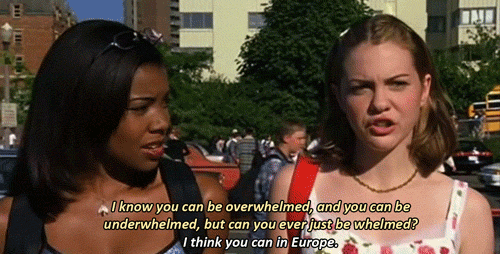
Did you know that in Europe, burnout is a legitimate mental health condition categorized in their Diagnostic and Statistical Manual of Mental Disorders (DSM)-equivalent, the ICD?
I learned that from this conversation between Tasha Eurich, an organizational psychologist and author of Insight: Why We’re Not as Self-Aware as We Think, and How Seeing Ourselves Clearly Helps Us Succeed at Work and in Life and Sheryl Ziegler, founder and Managing Director of The Child and Family Therapy Center and author of Mommy Burnout: How to Reclaim Your Life and Raise Healthier Children in the Process.
The conversation was enlightening/validating for me in a lot of ways:
It reinforced the concept of burnout as a cycle. It’s “the build-up of stress over time” plus dissonance of what you want or expect and what you’re actually getting. This often leads people to self-soothe in ways that may seem productive and positive in the short-term (hello booze, junk food, social media rabbit holes, and shopping!), but are not healthy ways to engage in self-care in the long-term, which only makes burnout worse.
It validated my feelings about burnout being a real threat to mental health. If you’ve ever experienced burnout (and you probably have), you’re probably going, “DUH!” right about now. But I think the fact that stories of bosses praising employees for taking mental health days go viral because they’re so progressive and rare tells you something about how we view burnout (and mental health in general) in the US—and in certain industries. I can attest to the fact that in nonprofits and academia (where I’ve spent nearly all of my career), burnout kind of comes with the territory.
Note: This is not the post for me to rant about all of the ways nonprofits are stuck in a cycle of burnout, but if you want to learn about it, listen to Dan Pallotta’s TED Talk, The Way We Think About Charity is Dead Wrong (transcript also available).
It taught me a way to recognize it. Since burnout is a chronic condition that builds up, recognizing it can sometimes take a while and be a bit delayed. Tasha Eurich shares the acronym ICE, where I = inefficient, C = cynical, and E = exhausted. Being more inefficient, more cynical, and more exhausted are symptoms/indicators of burnout. Makes sense to me: I’ve snapped out of a zombie-like trance of online shopping, realizing that I was looking for an escape on more than one occasion.
It confirmed my attitude about time off. Having control over my calendar is the best way for me to battle burnout. Just yesterday, I was in a meeting over lunch (which I hate doing) and it ran over (by a long time). I was hangry and stuffed my face on my way into another meeting. That sort of thing doesn’t happen often, but I recognize that not having control over my schedule a pretty good way to make me resent the work and become ICE-y. Making sure to take breaks throughout the day and full-fledged vacations helps me to combat ICE–and I know I have to be mindful about actually making it happen by blocking my calendar and pushing back on meeting invites (especially the ones that happen during lunch!).
It reminded me that there’s a way out. Tasha Eurich shares, “Ultimately, you’ve got three choices if you’re burnt out or unsatisfied. You can keep doing what you’re doing, you can change something, or you can get out.” I think we can all agree that continuing to do what we’re doing isn’t the right answer (even though it’s the easiest in the short run!). If you choose to change something, you might have to get creative, but little changes can really make a big difference overall. So big, in fact, that they might actually get you out of the burnout cycle entirely.
It taught me that we need to talk about burnout and motherhood. Burnout at work is—unfortunately—something of a badge of honor. But a mom who’s inefficient, cynical, and exhausted is faced with a level of judgment that is simply too harsh. I saw this quote recently: “We expect women to work like they don’t have children, and raise children as if they don’t work.” Ugh. Let’s stop perpetuating the myth that women can have and do it all (at the same time) and start acknowledging the trade-offs, sacrifices, and support staff required to have and do even some of it at the same time.
So, as we approach the end of the year, a time notorious for burnout because of the work/family/social obligations that come with it, keep tabs on if you’re ICE-y, be mindful on how you’re engaging in self-care, think about ways to take control of your calendar, and, importantly, don’t be a dick—especially to moms.



